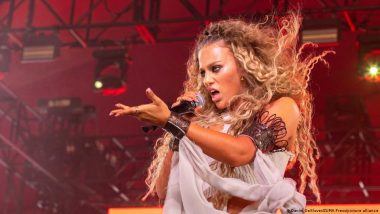Singing in Arabic wasn't part of Elyanna's original plan. Yet it's helping the 22-year-old Palestinian-Chilean singer make history, even as she wakes a fine line against the backdrop of current events.Elyanna does not like to be put in a box. It's something the Palestinian-Chilean singer underlines repeatedly in interviews. Yet despite her dislike of labels, she's currently earning herself one: the young Arab music sensation bringing Arabic-language pop to the global mainstream while challenging perceptions.
Also Read | Entertainment News | Cardi B Addresses Backlash over Met Gala Designer’s Identity.
Ironically, the 22-year-old never planned to sing in Arabic, her native language; she simply tried it out upon suggestion in a recording studio, as she told the Los Angeles Times in 2022. Her decision to embrace it has paid off: Her first single, "Ana Lahale" ("I'm my own"), released in 2020, has more than 24 million listens on Spotify. And in 2021, she became one of the headlining artists of the newly founded Universal Arabic Music label, a branch of the Universal Music behemoth.
Also Read | India News | CM Yogi Performs ‘Rudrabhishek’ on Occasion of ‘Akshaya Tritiya’.
Bridging generations and cultures
Recently, Elyanna's fame has taken on a new dimension. In 2023, she became the first Arab artist to sing a full set in Arabic at the Coachella festival. Shortly after, Rolling Stone magazine named her one of its 25 artists to watch that year. So far, 2024 has brought a sold-out North American tour, followed by her highly-anticipated first full-length album, "Woledto" ("I am born"), released on April 12.
Like all her music, the album draws on her Palestinian-Chilean identity, mixing Arab and Latin musical influences. The single "Ganeni" ("Make me crazy"), for instance, combines a reggaeton beat and Latin-flavored trumpets with Middle Eastern drumming and good dose of ululation.
Ramzi Salti, a professor at Stanford University and the host of "Arabology," a podcast on Arab culture and music, attributes her broad global and generational appeal to her ability to seamlessly fuse influences.
"I know my mom, who is 85, will listen to Elyanna and enjoy her, and my nephew here in Jordan, who is 15 and very particular, will listen to Elyanna," he told DW. "I think it comes back to her ability to mix East and West."
Salti described her as an "Arabic Beyonce" — an artist who, unlike many traditional female Arab singers, isn't shy about putting on a whole show. With the streetwear style of Rihanna, the sensuality of Shakira and fingernails to rival Spanish star Rosalia, Elyanna's creating a distinctive image for herself — one that goes against the stereotypical image of Palestinians often present in Western media.
"In a debate that too often casts Palestinians as either beleaguered victims or bloodthirsty terrorists, Elyanna presented a joyful and powerful representation of Palestinian life," columnist Rob Eschmann wrote on the US Jewish news site Forward in 2023.
And unlike Arabic music in general, which can be "alienating to Western audiences until someone explains its, Elyanna doesn't really need to be explained," Salti said. The music, with its dance beats, speaks for itself: "You feel it."
From Nazareth to California
Elyanna was born Elian Marjieh in 2002 to a Christian Palestinian family in the northern Israeli city of Nazareth, which is home to the country's largest population of Arab citizens; her paternal grandmother was from Chile. She began performing music at age 7, and when she was 15, the family moved to San Diego so she could further her music career. It was a decision that paid off: In the US, Elyanna gained popularity on Instagram and Soundcloud and connected with other North American-based Arab artists. In 2018 she was signed by powerhouse Lebanese Canadian manager Wassim Slaiby, who founded Universal Arabic Music in 2021.
Elyanna's music career is a family affair: Her brother is her pianist, producer and creative director; her sister is her stylist and designer; her mother, a poet, has contributed to her lyrics; and she cites her father as the glue holding everything together.
When it comes to her musical influences, Elyanna cites a range of performers, from Arabic greats like Lebanon's Fairuz to the Egyptian-born French-Italian Dalida, but also jazz icons like Etta James and more contemporary artists like Freddie Mercury and Beyonce. She has demonstrated her own musical versatility, covering Edith Piaf's classic "La Vie en Rose" ("Al Kawn Janni Maak") as well as the soulful Nigerian singer Zubi's hit "Sugar" ("Sokkar").
Drawing on her Palestinian identity
Yet it's her own songs and performances and their grounding in her identity, especially her Palestinian side, that define Elyanna as a musician and have put her on the cusp of conquering the global, English-dominated market.
Elyanna unabashedly celebrates her Palestinian heritage. Her concerts, photos and videos abound with bandanas, henna, traditional Palestinian embroidery, coin-bejeweled accessories and keffiyahs, the black-and-white checkered scarf that symbolizes Palestinian identity. Her posts on her TikTok and Instagram accounts, which each count more than 1 million followers, are peppered with watermelon emojis, a symbol of resistance to Israeli occupation of Palestinian territories, alongside doves, olive branches and white hearts. She also refers to "Palestine," including when she speaks of her birthplace, Nazareth.
Yet Elyanna's music is not political (her songs tend to be about staple hip-hop topics like love, fame and money). "I don't like politics at all ... I don't like those things where it's toxic and weird," she told the Los Angeles Times.
"I think the fact of being not overtly political is a political act in and of itself," Salti said, while pointing out that at the same time, her stylistic choices celebrating her identity can't entirely be divorced from politics. "That choice in itself is kind of political."
Walking a fine line post-October 7
October 7 changed the landscape in which she operates as a musician. In the following days, she expressed her emotions on social media, writing, "I'm praying for my family, friends & people back home ... I am just praying for everybody who is also praying for a better tomorrow." Shortly thereafter she postponed her North American tour. More recent posts have shown her attending Palestinian solidarity demonstrations.
"With the current events, I think people look to Elyanna. And maybe it wasn't fair," Salti explained. "But it was like she was in a no-win situation, because if she continued to release happy-go-lucky songs and dancing, people would say, look at Gaza and you're sitting here and singing and shaking, you know, and these happy beats. But then if she doesn't do that, if she doesn't sing at all, she's also blamed because she is not speaking out. And people are like, you're a Palestinian singer, you are so proud of it, you use your heritage all the time, why is it that now you are silent?"
"She has to walk this fine line in between," he added.
Elyanna's musical response to the Hamas terror attacks and the country's subsequent military action in Gaza was her single "Olive Branch (Goshn Zeytoun)," an emotional, accessible ballad that transmits a generalized message of pain and hope. "I'm far away, but I'm praying for you/And I'm sending peace, on an olive branch," the lyrics go. "In the land of peace, peace is dead/And the world is sleeping on a hurt child."
Edited by Elizabeth Grenier and Tanya Ott
(The above story first appeared on LatestLY on May 10, 2024 12:20 PM IST. For more news and updates on politics, world, sports, entertainment and lifestyle, log on to our website latestly.com).













 Quickly
Quickly





















